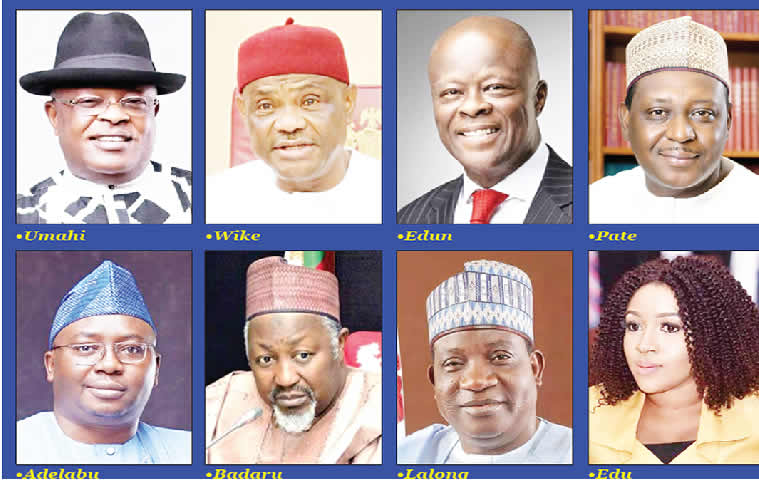
Oil workers have demanded results as President Bola Tinubu assigned the Petroleum Ministry portfolio to himself.
Like his predecessor, the President will head the petroleum ministry while a former Senator, Heineken Lokpobiri, is the Minister of State, Petroleum Resources.
The President on Wednesday unveiled the portfolios of 45 ministers nine days after they were confirmed by the Senate in a week-long screening exercise.
The ministers will be sworn in on by the President at the State House Conference, Aso villa, Abuja on Monday.
A statement on Wednesday by the Director, Information Office of the Secretary to the Government of the Federation, Willie Bassey said the ministers could attend the ceremony with two guests each.
The General Secretary, Petroleum and Natural Gas Senior Staff Association of Nigeria, Lumumba Okugbawa, said there was nothing wrong with the President occupying the position of petroleum minister.
He said, “All the ministers report to the President, so for him to hold the position of petroleum minister doesn’t really matter much. What we should demand is for him to perform. So it doesn’t really matter that he decided to hold that position.”
Okugbawa stated that former President Muhammadu Buhari occupied the same positions as President and petroleum minister, stressing that Tinubu could also handle the task.
“Since they’ve given somebody the position of Minister of State for Petroleum Resources, it doesn’t matter that the President is the petroleum minister. By the way, all the ministers report to the President,” he stated.
‘End vandalism’
A petroleum expert, Bala Zaka, said the petroleum minister must address the menace of crude oil theft and pipeline vandalism.
He also asked the government to formulate policies that would attract investments in the sector and consolidate full revitalisation of the industry in line with global practices.
He said, “The new minister must demonstrate indignation to make sure that crude oil thefts and pipeline vandalism is stopped immediately with the ultimate goal to improve oil production.
“He must put his foot firmly on the ground and make sure all these issues bedevilling the industry are solved. He must provide immediate solutions to these issues and formulate policies because investors are running away due to the country’s poor business climate.’’
Also a maritime lawyer, Emeka Akabogu, said, “If he is competent enough to be the president of Nigeria, then he is competent to also be the petroleum minister. Whether the President is competent enough or not is of no consequence he is the appointer, he is the commander in chief so he has the prerogative of what to do and what not to do.’’
Akabogu, who is the Convener of the globally acclaimed OTL Africa Downstream, a leading initiative for downstream petroleum business in Africa, stated, stated, ‘’We can only hope that it is done effectively, we can only hope that the ministers of states that he has appointed are able to discharge their functions to the benefit of Nigerians.”
The list indicated that the President appointed 13 of the nominees as ministers of state and also created new ministries and renamed a few others.
However, the names of a former governor of Kaduna state, Nasir El-rufai, a former national women leader of the All Progressives Congress, Stella Okotete and a ministerial nominee from Taraba state, Danladi Abubakar were missing from the list.
The Senate had withheld their confirmation on account of objections and petitions filed against their nominations by some Nigerians, but the red chamber said the three ministerial nominees were referred to the security agencies for appropriate checks.
Following the development, El-Rufai reportedly withdrew his nomination and recommended a loyalist to the President as his replacement.
To preside over the ministry of works is former Ebonyi State governor, Dave Umahi while ex-Jigawa State governor, Muhammed Badaru was appointed as the Minister of Defence.
Despite the clamour by Abuja natives for an indigene to be appointed as the Federal Capital Territory Minister, former Rivers State governor Nyesom Wike clinched the position. Mariga Mahmoud will work with Wike as the Minister of State, FCT.
On the other hand, an ex-law school director-general, Tahir Mamman heads the education ministry.
Bosun Tijani is the Minister of Communications, Innovation and Digital Economy, Ishak Salako is Minister of State, Environment and Ecological Management while Wale Edun is the Minister of Finance and Coordinating Minister Of the Economy.
Also on the list were the Minister of Marine and Blue Economy, Bunmi Tunji-Ojo; Minister of Power, Adebayo Adelabu; Minister of State, Health and Social Welfare, Tunji Alausa; Minister of Solid Minerals Development, Dele Alake; Minister of Tourism, Lola Ade-John while Adegboyega Oyetola was appointed the Minister of Transportation.
To administer the Minister of Industry, Trade and Investment is Doris Anite while Uche Nnaji would hold fort as the Minister of Innovation Science and Technology.
A former lawmaker, Nkiruka Onyejeocha will pilot the affairs of the Ministry of State, Labour and Employment; Uju Kennedy heads the Ministry of Women Affairs and Festus Keyamo is Minister of Aviation and Aerospace Development.
The Minister of Youth is Abubakar Momoh; Minister of Humanitarian Affairs and Poverty Alleviation, Betta Edu; Minister of State, Gas Resources, Ekperikpe Ekpo and Minister of Sports Development, John Enoh.
Musawa arts
Others are Minister of Arts, Culture and Creative Economy, Hannatu Musawa; Minister of State Defence, Bello Matawalle; Minister of State, Education, Tanko Sununu; Minister of Housing and Urban Development, Ahmed Dangiwa; Minister of State, Housing and Urban Development, Abdullahi Gwarzo; Minister of Budget and Economic Planning, Atiku Bagudu; Minister of State, Water Resources and Sanitation, Bello Goronyo and Minister of Agriculture, Abubakar Kyari.
Former Yobe governor, Ibrahim Geidam emerged as the Minister of Police Affairs; a former Nigerian ambassador to Germany, Yusuf Tuggar will lead Nigeria’s foreign diplomacy as the Minister of Foreign Affairs.
Tinubu also appointed Saidu Alkali as the Minister of Interior; Ali Pate as the Coordinating Minister of Health and Social Welfare, Maigari Ahmadu as Minister of State, Steel and Development and Shaibu Audu as Minister of Steel and Development.
The 45-man list included the Minister of Information and National Orientation, Muhammed Idris; Attorney General of the Federation and Minister of Justice, Lateef Fagbemi, SAN; Minister of Labour and Employment, Simon Lalong; Minister of State, Police Affairs, Inman Suleiman; Minister of Special Duties, Zephaniah Jisalo; Minister of Water Resources and Sanitation, Joseph Utsev and Minister of State, Agriculture and Food Security, Aliyu Abdullahi.
Speaking with The PUNCH, the Director-General of the Manufacturers Association of Nigeria, Segun Ajayi-Kadir said that MAN was particularly interested in the office of the minister overseeing the manufacturing industry.
According to him, since the association has not had any prior engagement with the newly appointed minister of trade and investment, it would take its time to examine the minister’s profile.
“What is important to us is what the person does from now on. What the person has done may be a yardstick for assessing the person, but what is of critical importance now is — having assumed this role now, what are you looking forward to?
“We have not engaged with the new minister. My take is that it should not just be taken as an appointment for four years. It has to be an appointment that is based on delivery. It should be KPI-based. It shouldn’t be, because you have been made a minister, and for the next four years, you are occupying a position. There should be yardsticks for measuring the mandate that they have been given,’’ he submitted.
Also, the Deputy-President of the Lagos Chamber of Commerce and Industry, Gabriel Idahosa said that while some of the appointees were round pegs in round holes, others were based on political compensations rather than competence.
He questioned the president for entrusting the ministry of defence to a former governor despite the sensitive nature of the ministry and the insecurity crisis the country had endured in the past few years.
Idahosa, however, commended the president for splitting the transport ministry into three. This, he said, would provide the platform to tap the full potential of the transportation sector.
He said, “Some are round pegs. Some of them are political appointees, like the Minister of Defence. I don’t know why the president thought that was the right person for the job. But, somehow, you have to throw in jobs for the boys.”
Both Idahosa and Ajayi-Kadir commended the president for expanding the latitude of the Ministry of Finance to encompass the role of the Coordinating Minister of the Economy.
The Chief executive Officer of the Nigerian Economic Summit Group, Mr. Laoye Jaiyeola said the important thing was for the government to move the economy forward.
“My own (take) is to let us move the economy forward for the good of the country. Asking if this person is good or not is the least of my problems. For me, the day people are confirmed to be ministers and they were confirmed without portfolios it means they can be asked to work anywhere.”
The Director General of the Nigeria Employers Consultative Association, Mr. Wale Oyerinde, commended the government for assigning portfolios to the ministers.
He said, “We commend the President for the release of the list of ministers as announced today. We urge that they settle quickly into the difficult task of an economic renaissance. It is instructive to note that the ministers are coming at a time when the nation needs deliberate and focused interventions.
“We are particularly impressed with the portfolios assigned to Mr. Wale Edun, Minister of Finance and Coordinating Minister of the Economy; Solomon Lalong as Minister of Labour and Employment, Nyesom Wike, Minister of FCT, and others as we look forward to working with them to drive our economy out of the hole it currently finds itself and also fast-track the total reform of our industrial relations system.”
But retired Group Captain Sadique Shehu argued that the defence ministry should have been manned by someone with a military background.
He, however, urged the defence ministers to surround themselves with people who are well-informed about military activities.
He noted, “Having a military man or civilian as minister of Defence has its advantages and disadvantages. The fact that they are civilians with no military background does not mean they would be a bad minister but they must realize that they are in a terrain they do not know.
“They need to have staff who are well grounded about the military otherwise they would be in the dark. Ideally, the position should have been given to a military man if not for anything but because of the insecurity we are having.
“I am a military man, I can tell you soldiers respect people that know what they know. They also like to take advantage of someone who doesn’t know anything about them.”
Another security expert, Timothy Avele urged the ministers to work together with the service chiefs if they must succeed in their tasks.
He said, “This is a sensitive position and should not be toyed with. But the deed is done. The new ministers must work together with the security chiefs if they’re to succeed in the new assignment. Everyone must be carried along.’’
The President of the National Association of Nigeria Nurses and Midwives, Michael Nnachi, lauded the appointment of Dr Ali Pate as the Coordinating Minister of Health and Social Welfare.
Nnachi said, “We expect a lot of good things and positive changes in the health sector, and I think he will deliver, but you know sometimes when you take up certain positions, you will see some influences, and some will give you information that does not exist.
“However, I know Dr Pate will perform because I know a little about him and I have read about him, and the best thing is to expect positive changes. We are anxious to see how the health sector can move forward, even though the nurses have been marginalised and maltreated, we are willing to support and contribute to the harmony in the health sector.”
He questioned the president for entrusting the ministry of defence to a former governor despite the sensitive nature of the ministry and the insecurity crisis the country had endured in the past few years.
Idahosa, however, commended the president for splitting the transport ministry into three. This, he said, would provide the platform to tap the full potential of the transportation sector.
He said, “Some are round pegs. Some of them are political appointees, like the Minister of Defence. I don’t know why the president thought that was the right person for the job. But, somehow, you have to throw in jobs for the boys.”
Both Idahosa and Ajayi-Kadir commended the president for expanding the latitude of the Ministry of Finance to encompass the role of the Coordinating Minister of the Economy.
The Chief executive Officer of the Nigerian Economic Summit Group, Mr. Laoye Jaiyeola said the important thing was for the government to move the economy forward.
“My own (take) is to let us move the economy forward for the good of the country. Asking if this person is good or not is the least of my problems. For me, the day people are confirmed to be ministers and they were confirmed without portfolios it means they can be asked to work anywhere.”
The Director General of the Nigeria Employers Consultative Association, Mr. Wale Oyerinde, commended the government for assigning portfolios to the ministers.
He said, “We commend the President for the release of the list of ministers as announced today. We urge that they settle quickly into the difficult task of an economic renaissance. It is instructive to note that the ministers are coming at a time when the nation needs deliberate and focused interventions.
“We are particularly impressed with the portfolios assigned to Mr. Wale Edun, Minister of Finance and Coordinating Minister of the Economy; Solomon Lalong as Minister of Labour and Employment, Nyesom Wike, Minister of FCT, and others as we look forward to working with them to drive our economy out of the hole it currently finds itself and also fast-track the total reform of our industrial relations system.”
But retired Group Captain Sadique Shehu argued that the defence ministry should have been manned by someone with a military background.
He, however, urged the defence ministers to surround themselves with people who are well-informed about military activities.
He noted, “Having a military man or civilian as minister of Defence has its advantages and disadvantages. The fact that they are civilians with no military background does not mean they would be a bad minister but they must realize that they are in a terrain they do not know.
“They need to have staff who are well grounded about the military otherwise they would be in the dark. Ideally, the position should have been given to a military man if not for anything but because of the insecurity we are having.
“I am a military man, I can tell you soldiers respect people that know what they know. They also like to take advantage of someone who doesn’t know anything about them.”
Another security expert, Timothy Avele urged the ministers to work together with the service chiefs if they must succeed in their tasks.
He said, “This is a sensitive position and should not be toyed with. But the deed is done. The new ministers must work together with the security chiefs if they’re to succeed in the new assignment. Everyone must be carried along.’’
The President of the National Association of Nigeria Nurses and Midwives, Michael Nnachi, lauded the appointment of Dr Ali Pate as the Coordinating Minister of Health and Social Welfare.
Nnachi said, “We expect a lot of good things and positive changes in the health sector, and I think he will deliver, but you know sometimes when you take up certain positions, you will see some influences, and some will give you information that does not exist.
“However, I know Dr Pate will perform because I know a little about him and I have read about him, and the best thing is to expect positive changes. We are anxious to see how the health sector can move forward, even though the nurses have been marginalised and maltreated, we are willing to support and contribute to the harmony in the health sector.”





